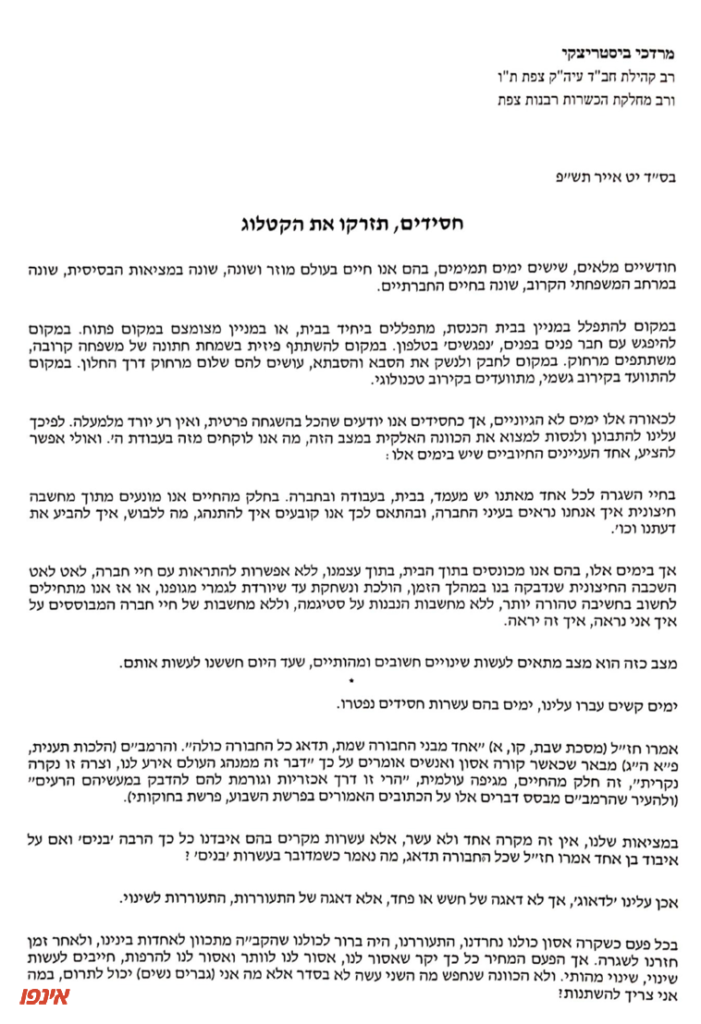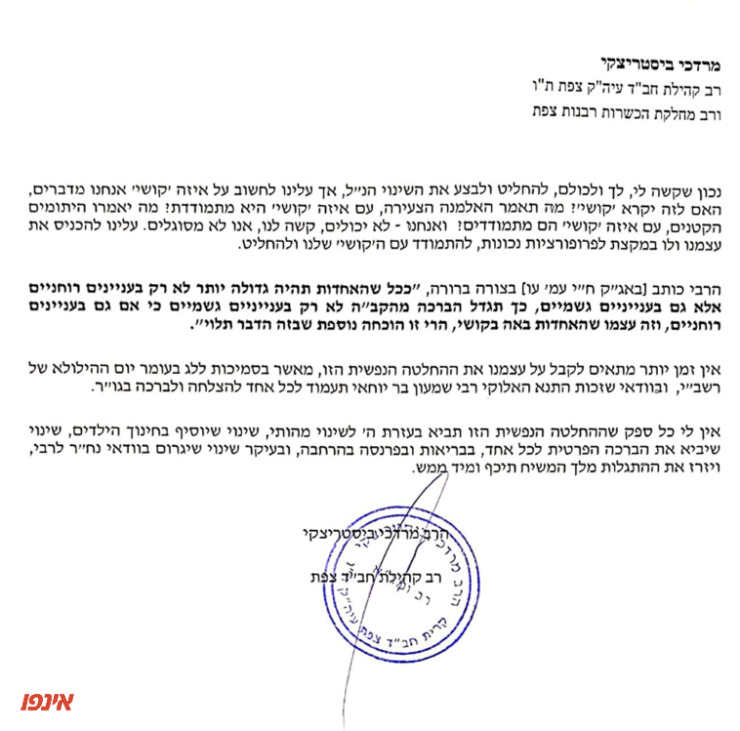Achdus: Yechi or Ohel?
If, for someone, proclaiming “Yechi” after davening is a supreme value, even though I don’t agree with that, and I think he’s mistaken, I must know that his intention is to serve Hashem and connect with the Rebbe. If, for someone, going to the Ohel is “holy of holies,” even if I disagree with him and I think he is mistaken, I must know that his intention is to serve Hashem and connect with the Rebbe • Written by Rabbi Mordechai Bistritzky, Rav of the Chabad Community of Tzfas • Full Letter
Written by Rabbi Mordechai Bistritzky, translated by ChabadInfo.com
Two full months, sixty entire days, in which we have lived in an alternate universe that was different and bizarre, different in terms of basic existence, different in terms of family life, and different in terms of social life.
Instead of davening in a minyan in shul, we daven on our own at home or in a small minyan out in the open. Instead of meeting with a friend face to face, we “meet” on the phone. Instead of physically participating in the wedding of a relative, we participate from a distance. Instead of hugging and kissing grandparents, we wave through the window. Instead of farbrenging in close physical proximity we farbreng through technological closeness.
These appear to be irrational times, but as Chassidim, we know that everything is by Divine Providence and no evil descends from above. Therefore, we need to contemplate and try to figure out what the Divine intention is. What do we take from this in our avodas Hashem and perhaps we can suggest one of the positive aspects of these days.
In our routine lives, each of us has a position at home, at work and in society. In part of our lives we are driven by the superficial thought of how we appear to others and in accordance with this, we decide how to behave, what to wear, and how to express our views etc.
But these days, when we are at home, living inside our own skins, without the possibility of making an appearance in the larger social setting, slowly but surely the outer layer that has attached itself to us over time is being ground down until our bodies shed it completely, and then we start thinking with purer thoughts, without considering stigmas and social constraints, or social considerations that are based on how we look and what it will look like.
A situation like this is one in which important changes can be made that we were afraid to make until now.
We have gone through tough times, when dozens of Chassidim passed away.
Chazal say (Shabbos 106a) “When one member of a group dies, the entire group should worry.” The Rambam (Laws of Taanis, chapter 1, halacha 3) explains that when a tragedy occurs and people say, “That’s the way of the world which happened to us and this misfortune just happened,” that’s life, a global pandemic, “this is cruelty and causes them to cling to their evil deeds.” (Note, the Rambam bases this on what it says in parshas Bechukosai.)
In our reality, it is not one incident and not ten, but dozens of incidents in which we lost so many “members” and if, over the loss of one member, Chazal say that the entire group should worry, what should we say when it’s dozens of “members?”
So we need to “worry” but not a worry of fear, of trepidation, but of spiritual awakening, an awakening for change.
Every time a tragedy occurred, we were shaken up, we were woken up, it was clear to us all that Hashem intends for unity among us, and after a while we went back to our routines. This time though, the cost is so high that we cannot pass it up and we cannot weaken; we must make a change, a fundamental change, and this doesn’t mean we should look for what the other person is doing wrong but at what we (men and women) can contribute. How can we change?
I’ve thought about something small, but large.
STAGE 1: VEER FROM EVIL
In a “general letter” for Lag B’Omer (13 Iyar 5730, printed in Sefer Maamarim melukat, volume 1, page 133; in Igros Kodesh volume 26, page 125; and in Likutei Sichos volume 7, page 341), the Rebbe writes, “Man must look favorably at every observer of Torah and mitzvos and treat him with great respect even if that person’s way is not his own way! Since he serves Hashem and the difference is only that he serves with love of G-d and he serves with fear of G-d, etc.”
When we examine the wording of the letter, we see something very important, a great foundation for unity. The Rebbe writes that since the person observes Torah and mitzvos, we need to look at him favorably and treat him with great respect. The emphasis is not on the Chassid who says Chitas and Rambam and goes on mivtzaim etc. but “only” on the person who observes Torah and mitzvos; you should still treat him with great respect. Obviously, this applies all the more so when talking about Chassidim that we need to act with great respect. (It is recommended that the entire letter be studied, especially during sefira).
Therefore it is imperative that we each make a good resolution of sur mei’ra (veering from evil). It is out of the question to have a situation in which we disparage one another because the other thinks differently than I do; not a disparaging thought, not a disparaging word, and surely not a disparagement in deed.
If, for someone, proclaiming “Yechi” after davening is a supreme value, even though I don’t agree with that, and I think he’s mistaken, I must know that his intention is to serve Hashem and connect with the Rebbe and therefore, I am forbidden from disparaging him or writing or publicizing things that offend him.
If, for someone, going to the Ohel is “holy of holies,” even if I disagree with him and I think he is mistaken, I must know that his intention is to serve Hashem and connect with the Rebbe and therefore, I am forbidden from disparaging him or writing or publicizing things that offend him.
If someone writes titles for the Rebbe on the sichos which I think, even if rightly so, do not befit the Rebbe, although I disagree with him I am forbidden from disparaging him or writing or publicizing things against him. It is forbidden for me to rip up the sichos and I surely cannot throw them in the garbage, and it is certainly forbidden to reach a point of physical altercation.
We must beware and educate the members of our household not to disparage the conduct of someone else, not to speak against others at the Shabbos table (not to mention things which are out of the question such as raising a hand, G-d forbid!).
After the first stage of “veering from evil”, we can succeed in the second stage of “doing good.”
STAGE 2: DOING GOOD
Let us get acquainted with one another, just for the sake of getting acquainted. Let us get to know the “existence” of the other, the feelings of the other, and it makes no difference who the “other” is and what his views are.
I am sure that there are people reading this who are wondering what I am talking about. Don’t I know my friend? Am I offending anyone? Hurting him?
I’m not talking about that kind of offense. Each of us is a tzaddik. I mean that everyone should ask himself, would I feel comfortable sitting together with so-and-so at a farbrengen? Would I set up a chavrusa with him to learn Torah? Would I take the trouble to attend his simcha? I mean the neighbor, the classmate, the one who is “not as important as I am,” the one who wears a different yarmulka than me.
My neighbor, the one who is not religiously observant and who externally looks so different than me, I’ll treat with respect, I will take an interest in his welfare, I will look at him favorably, I will forgo my comfort (spiritually too) so he will feel good with me. I will try to ensure that my children don’t make noise during siesta hours and I will even look for an opportunity to set up a shiur with him. Then why, when it comes to a Chassid like myself, a neighbor, classmate etc. who has different views than I do, do I not treat him the same way, I won’t try to be close with him, to take his feelings into consideration, to look for opportunities to learn a sicha of the Rebbe with him? Why, because he thinks differently than me?
26 years have passed already since Gimmel Tammuz and we have still not been saved. Over the years, the lack of consideration for the feelings of others has become a fait accompli, solidified in concrete, and now it isn’t pleasant to change, because if I change, it might look like I was mistaken until now. And that is how we live in a terrible galus. This one says it’s all mine and that one says it’s all mine…
Since we haven’t arrived at the destination yet and we are in the midst of a global pandemic, the time has come to think in a new way about where we are headed. Is our current way leading us to the goal that the Rebbe demands of us to bring the Geula or maybe the signage that we followed on the highway pointing to a certain direction is leading us to the wrong place!
The time has come for each one of us, simple people, rabbanim, shluchim and directors of mosdos, to simply decide, a decision from the depths of our consciousness, to “get to know” one another.
This decision does not mean that I need to change my view and there is no capitulation here or weakness; this is about strength.
Yes, I am strong enough to get to know another.
Yes, I am strong enough to get close to him without changing my view.
Yes, I am strong enough to consider his feelings even when it requires me to give in and I am right.
Another angle:
Our pattern of thinking works according to a “color catalog” of sorts. If so-and-so is that color in the catalog, when I look at him do I see a person, a Chassid, or do I just see a certain color, where he belongs socially?
Chassidus explains that Hashem gave each of us qualities that society needs to get from us. But if I look at him according to his “color,” I cannot relate to him properly since I cannot see in him any special qualities and I cannot receive anything from him. In the end, I am the one who loses out.
The time has come to stop this catalog thinking, to stop seeing people according to societal colorations and to start seeing the truth, to see Chassidim.
***
We are in the midst of a communal awakening to achdus, an awakening that began after the tragedies of so many Chassidim dying from corona, but with the passing of my friend and fellow shliach back when we were in the yeshiva in Milan, the young shliach Rabbi Benny Wolff, it took on greater urgency and elicited a great cry of “ad mosai?”
True, it is hard for me, you, and everyone to decide to make this change but we need to think about what kind of “difficulty” we are talking about. Is this what we call “hard?” What should the young widow say; what “difficulty” is she dealing with? What should the young orphans say? What “difficulty” are they dealing with? And we can’t; it’s hard for us, we are not capable? We need to get ourselves the right perspective so we can deal with the “hardship” and make the decision.
The Rebbe writes (Igros Kodesh volume 10, p. 76) in unequivocal fashion:
“The greater the unity not only in spiritual matters but also in material matters, the greater the blessing from Hashem not only in material matters but also in spiritual matters and the fact that the unity came with difficulty is additional proof that the matter depends on this.”
There is no better time to take this soul-commitment upon ourselves than in the aftermath of Lag B’Omer, marking the hilula of Rabbi Shimon bar Yochai and surely the merit of Tanna Eloki will stand by each one for success and blessing, materially and spiritually.
I have no doubt that this commitment will, with Hashem’s help, bring a fundamental change, a change that will enhance the chinuch of children, a change that will bring personal blessing to each one, with health and expansive parnassa, and mainly, a change that will surely give nachas ruach to the Rebbe and hasten the hisgalus of Melech Ha’Moshiach immediately.
Rabbi Mordechai Bistritzky
Rav of the Chabad Community – Tzfas
Rav of the Rabbanut Kashrus Division – Tzfas












1023
Join ChabadInfo's News Roundup and alerts for the HOTTEST Chabad news and updates!










































